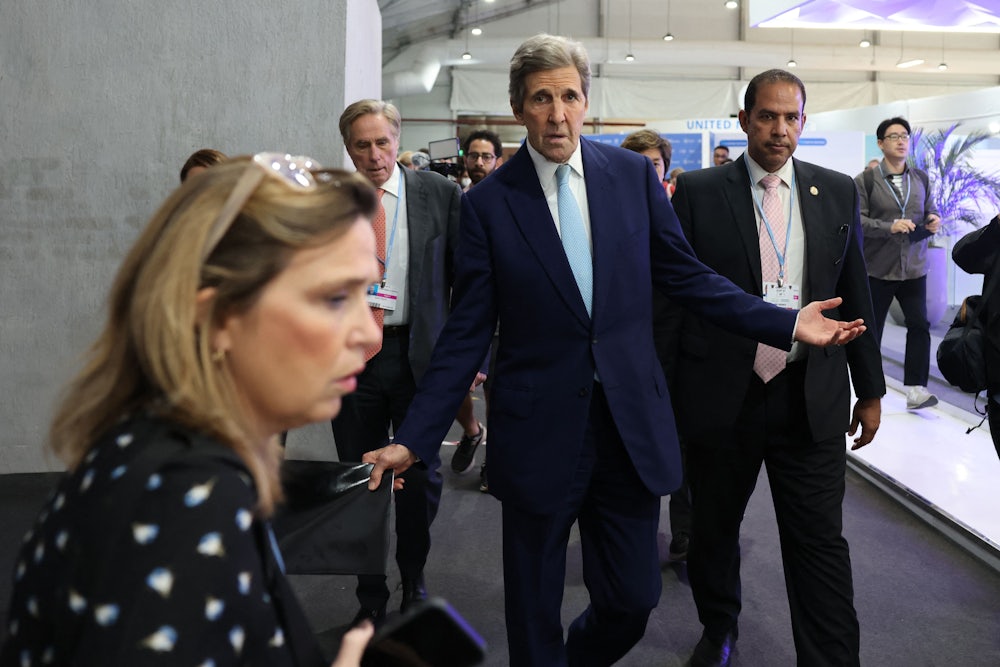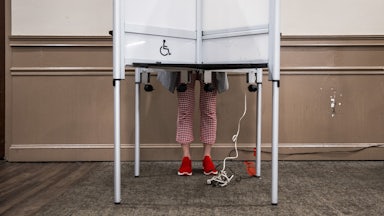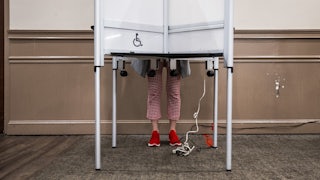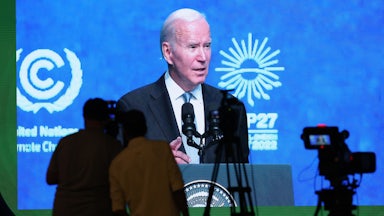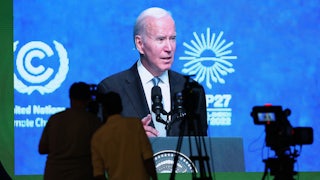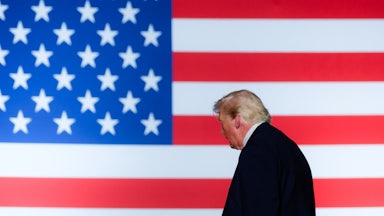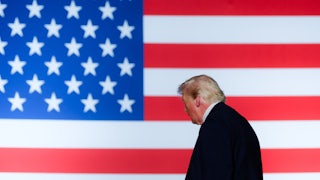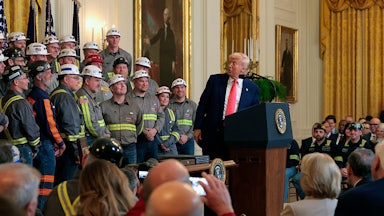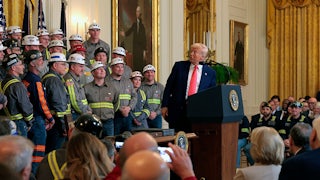U.S. climate envoy John Kerry and the other U.S. negotiators at the U.N. climate talks showed no sign of budging at a meeting with nongovernmental organizations last week: In accordance with long-held U.S. positions, there would be no dedicated fund for loss and damage established at COP27. “That’s just not happening,” Kerry had told reporters for the umpteenth time the week before.
Yet in the 72 hours that followed, some 30 years of opposition abruptly dissolved. The world’s largest historical emitter got out of the way. Early Sunday morning, the assembled representatives at COP27 finalized an agreement to establish a fund to help vulnerable developing countries deal with the fallout from wealthier nations’ emissions.
The reversal caught more than a few seasoned insiders to the process off guard. “COP27 was a surprise precisely because for once the needs of the vulnerable were actually listened to,” Powershift Africa’s Mohamed Adow, a longtime campaigner for a loss and damage fund, tweeted. Asked if she was surprised by the outcome, Jean Su—director of the Energy Justice Program and senior attorney at the Center for Biological Diversity—said simply, “Shocked.” Just a day before, she told me, “they had said there was no way they were going to support a fund.”
The seriousness of this loss and damage fund, of course, will be determined in its details—almost all of which have yet to be worked out. And attendees were cognizant of other, more disturbing, outcomes from the two weeks of talks. But as what was once thought to be an unbreakable wall of U.S. opposition seemed to crumble, veterans of U.N. climate talks reported feeling something they hadn’t experienced in those halls in a long time, if ever: optimism.
“I know that right now it’s just a step, but it feels like a moment of hope,” said Joie Chowdhury, a human rights lawyer who tracks loss and damage negotiations at the U.N. with the NGO ESCR-Net. “I know we get crushed relentlessly and that we’re not addressing the bigger questions of models of development and capitalism that we have to address to reach the Paris Agreement goals. But it seemed so intractable, and the fact that it happens means a lot.”
How exactly this did happen comes down to both decades of pressure from the countries most vulnerable to climate change and a series of events in the last two weeks that may not be fully understood for years to come. One crucial factor was an uncommon amount of unity among the G77 and China, a negotiating bloc of some 134 countries that released a proposal for what a fund would look like early last week. “Divide and conquer tactics just didn’t work this time. The G77 put forward a proposal early on in week two and stuck to it for the entire rest of the week,” said Brandon Wu, director of policy and campaigns for the nonprofit ActionAid USA.
“I’ve never come out of a COP feeling celebratory. When the Paris Agreement was signed, I was pissed. I was angry about how the Paris Agreement deprioritized lives and livelihoods of frontline communities around the world,” Wu told me. “I’ve never come out of one of these negotiations feeling positive about an outcome.”
Small-island states first proposed loss and damage funds around the start of the United Nations Framework Convention on Climate Change, or UNFCCC, process some 30 years ago. Since then the concept has faced consistent opposition, most notably from wealthy countries wary of being made to pay compensation for their outsize contribution to the climate crisis. That question of liability and what the rich world owes is part of what led the U.S. to blow up the Kyoto Protocols in 1997 and send the world back to the drawing board to create a climate deal that its largest economy could abide by. During the drafting of what became the Paris Agreement in 2015, the liability issue was a key sticking point for the U.S., expressed in Paragraph 51, establishing that the Agreement “does not involve or provide a basis for any liability or compensation.”
In the years since, the G77 and China had largely stopped using the liability and compensation, or reparations, language, leaning instead on the principle of “common but differentiated responsibility” baked into the UNFCCC itself. But U.S. negotiators have remained preemptively defensive. Just last week, Kerry said the U.S. and other countries would refuse to establish “some sort of legal structure that is tied to compensation or liability,” although no such proposal was on the table. That they’d been willing even to talk about loss and damage at climate talks last year in Glasgow and agreed to add it as an agenda item for COP27 was seen as a major sign of progress.
When the G77 plus China released its proposal for what a fund would look like last Tuesday, the U.S. and other rich countries were still advocating instead for a “mosaic” of funding arrangements for loss and damage that wouldn’t be decided for years to come. The next day, EU climate chief Frans Timmerman announced his support for a dedicated facility, though demanding the donor base be widened to include other major emitters like China and India and that recipients be limited to a smaller group of countries “most vulnerable” to climate change. Between Wednesday and Saturday, negotiators haggled over various options, ranging from a dedicated fund to a more watery set of funding “arrangements.” The resulting text had a little something for everyone, with the countries stating that they hereby:
Decide to establish new funding arrangements for assisting developing countries that are particularly vulnerable to the adverse effects of climate change, in responding to loss and damage, including with a focus on addressing loss and damage by providing and assisting in mobilizing new and additional resources, and that these new arrangements complement and include sources, funds, processes and initiatives under and outside the Convention and the Paris Agreement;
Also decide, in the context of establishing the new funding arrangements referred to in paragraph 2 above, to establish a fund for responding to loss and damage whose mandate includes a focus on addressing loss and damage.
Reportedly rankled by being cast as bad guys in the press, the U.S. had first acted as a broker between groups pushing various options. But U.S. negotiators eventually got a sign-off from the White House to back the creation of a fund in the eleventh hour, according to sources familiar with the U.S. position. The U.S. delegation, observers said, was especially frustrated that the Inflation Reduction Act—which Kerry and Biden praised loudly at every opportunity—didn’t make a bigger splash and generate goodwill.
“A multilateral system—especially this kind of consensus-based process where you have the biggest polluters, former colonizers, and most affected at the same table—has its hard limits. But within that system it’s a groundbreaking decision,” Chowdhury told me of the fund’s establishment. This agreement, however, is just a beginning. Details will be worked out by a committee tasked with holding three meetings before next year’s COP in the United Arab Emirates, with the first due to happen by the end of March. Work to shape what these details will look like begins almost immediately. Who sits on the committee, how “particularly vulnerable” is defined, and where funds will come from will all determine the efficacy of the final fund. It still doesn’t have a firm home within the U.N. Some fear that could lead the fund to function as a largely extraneous, floating body outside the UNFCCC.
“The danger is that the fund gets created but then is just completely buried, deprioritized, and doesn’t get money, and it’s the other arrangements—whatever that might mean—that get all of the political attention and resources,” Wu told me. “Innovative” sources of funding referenced in the full text, Chowdhury said, could mean “windfall taxes on the fossil fuel industry, but it could also be private finance that comes with conditionalities. Who is making those decisions? Who can block those decisions?”
The fund’s ability to meet emergent needs in poorer and more vulnerable nations also depends on how much loss and damage from climate change there winds up being. In that context, it’s clear that the exceptionally weak language regarding fossil fuels in this year’s COP text is a major setback. “There will not be enough money in the world to cover the kind of damage we’ll see if the tap is not turned off,” Chowdhury said.
There was some progress on that front this year, however. Some 80 countries at COP27—including the U.S.—eventually supported language proposed by India calling for a “phase-down” of fossil fuels rather than just coal. The language was blocked from the final text, principally by major oil exporting countries, including Saudi Arabia and Russia. The U.K., the EU, and other wealthy countries loudly proclaimed their support for the abandoned language and, similarly, loudly mourned pared-down language on goals to stay below 1.5 degrees Celsius (2.7 degrees Fahrenheit), versus two degrees. People I spoke with saw those stances as odd given both governments’ enthusiasm for continued fossil fuel development.
“Since the EU and [COP 26 President] Alok Sharma are disappointed that fossil fuel phase-out is not in the text,” Third World Network director and developing country adviser Meena Raman told The Guardian, “we would like them to take leadership and revise their NDCs [“nationally determined contributions,” meaning emissions goals] and put into plans their fossil fuel phase-out urgently and stop expansion of fossil fuels including oil and gas.”
Even the best-case scenario for the new loss and damage fund doesn’t obviate the need for deeper reforms of the international system, particularly the International Monetary Fund and World Bank. Climate-vulnerable countries face untenable, inordinate debt burdens; the public debt stock of the 58 most vulnerable countries accounts for 27 percent of their combined gross domestic product. Such obligations make responding to disasters difficult, and mitigation and adaptation potentially impossible.
“The system that is in place is really perverse,” said climate policy adviser Enrique Maurtua Konstantinidis. Even for middle-income developing countries like Argentina, where Maurtua Konstantinidis lives, massive debt obligations incentivize extracting whatever fossil fuels are on offer—especially as a strong dollar makes paying back dollar-denominated debts more difficult. “You have a country that produces petrol and gas and has a really large amount of farming and cattle, that is always dependent on the sale of commodities,” he told me. “The way that the IMF looks at us [is] also with that view: knowing that the debt can be repaid with all the commodities.”
As with most COPs, this one was also rife with disappointments. Talks on Article 6 of the Paris Agreement—governing carbon markets—were seen as a bust, potentially opening the door to double-counting of carbon offsets, meaning that companies and countries will continue emitting while claiming to meet targets. Work items in other areas like the global stock-take—meant to assess progress since the Paris Agreement—were sluggish, thanks in no small part to meddling from the record number of fossil fuel lobbyists in attendance. And the host country’s disastrous human rights record, including the imprisonment of hunger-striking blogger and software developer Alaa Abd El Fattah, haunted the entire proceedings. One of an estimated 60,000 political prisoners in Egypt, El Fattah neared death during the negotiations after embarking on a water strike on the conference’s first day. President Abdel Fattah El Sisi carried out a nationwide crackdown on Egyptian activists just before COP27 began. Visiting delegates were subject to surveillance and harassment, with limited opportunities for civil society engagement. While alive and no longer on hunger strike, El Fattah remains jailed, with few assurances of release. Given the onslaught of climate-fueled disasters this year, however, one piece of decent news emerging from usually dreary U.N. climate talks is certainly better than none—and more than just about anyone expected.
